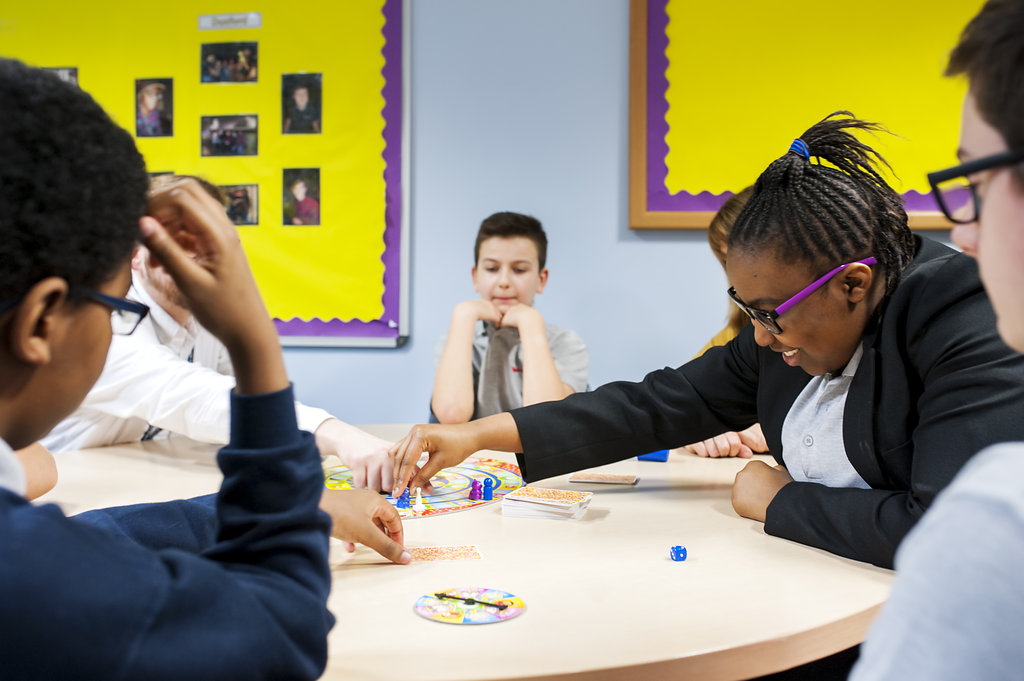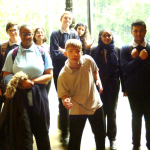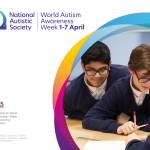For the borough SEND report please click here
Student Development (SDD)

This department has a crucial role to play in helping us meet our goal of ‘Success For All’. Student Development have a range of responsibilities within the School.
This department has a crucial role to play in helping us meet our goal of ‘Success For All’. Student Development have a range of responsibilities within the School.
At JRCS, we strive to provide for individual needs and to offer equal opportunities for all. We recognise, however, that children respond to learning opportunities differently and progress at different rates. Therefore we have a team of staff who work within the classroom, with subject teachers, helping to make the work accessible to all students. Thus, we aim to meet individual needs through the mainstream curriculum but, where it is appropriate, we do provide 1:1 or small group tutorials to help students.
Curriculum Support
For a small group of identified students in KS4,JRCS offers curriculum support as one of the students options, this allows the students additional time and support with the option subjects they have chosen as part of their curriculum to maximise their potential.
Support for students with English as an additional language (EAL)
Within the school there are opportunities for students with EAL needs to seek support and intervention from EAL specialists. This support may be provided by additional exercises, 1:1 support in or out of lessons and specific EAL resources.
More recently there are opportunities for students with English as an additional language to sit GCSE’s in their first language. This provides these students with another qualification. Language specialists from outside agencies work with these students after school.
How do students access the services provided by the Student Development Department?
There are a number of referral routes:
- via the School pastoral system, through their Head of Year, form tutors, pastoral assistants and/or senior leadership team
- via analysis of assessment data
- via the Local Authority special needs service
- requests from students themselves, parents or other agencies
- Student Support Panel
Definition of special educational needs
Students have special educational needs if they experience a barrier to the progress in school which calls for special educational provision to be made for them.
At JRCS, students have a special educational need if they:
- have a significantly greater difficulty in learning than the majority of children of the same age
- have a disability which, despite reasonable adjustments, prevents or hinders them from making use of educational facilities of a kind generally provided for children of the same age in schools within the area of the Local Educational Authority
At JRCS, special educational provision means any provision which is additional to, or different from, the educational provision made generally for students of their age.
Our Special Educational Needs and Disability (SEND) policy details how the school will do its best to ensure that the necessary provision is made for any student who has special educational needs and that those needs are made known to all who are likely to teach them. The school will ensure that teachers in the school are able to identify and provide for students who have special educational needs allowing them to join in the activities of the school so far as is reasonably practical and compatible with the education of other students.
The School will have regard to the SEND Code of Practice 2014 0 – 25 years, LEA’s inclusion policy, and Disability Act 2010. Partnership with parents/carers plays a key role in enabling children and young people with SEND to achieve their potential. JRCS recognises that parents/carers hold key information and have knowledge and experience to contribute to the shared view of their child’s needs and the best ways of supporting them. All parents/carers of children with special educational needs will be treated as partners and supported to play an active and valued role in their children’s education.
Students with special educational needs often have a unique knowledge of their own needs, and their views about what support they would like to help them make the most of their education will be ascertained. They will be encouraged to participate in all the decision-making processes and contribute to the assessment of their needs, the review and transition processes.
All teachers are teachers of students with special educational needs
Teaching students with SEND is a whole-School responsibility, requiring a whole-school response. All teachers take account of the wide range of abilities, aptitudes and interests of the students. For students with SEND, it may be necessary to provide an enhanced level of provision to support their learning.
Graduated response
JRCS will adopt a graduated response to meeting SEND that requires the initial use of classroom and School resources and quality first line teaching. Additional specialist expertise or advice may be needed to address the needs of students at SEN Support level. The School will record the steps taken to meet the needs of individual students.
English as an additional language
The identification and assessment of the SEND of young people whose first language is not English requires particular care. A direct referral will be made to the LEA’s Language Support Service when assessment shows that a student may require additional language support. An identified member of SDD will have responsibility for co-coordinating the EAL provision
Special Educational Needs Support
Since the SEND Code of Practise 2014 has been introduced SEN support is no longer catergorised according to the involvement of external services/support. It includes students previously identified as School Action and School Action Plus who require any additional intervention which is additional to/or different from the normal school provisions.
When a student is identified as having special educational needs, School will provide interventions that are additional to or different from those provided as part of the School’s usual differentiated curriculum. The triggers for intervention through SEN Support could be concern, underpinned by evidence, about a student who, despite receiving differentiated learning opportunities:
- makes little or no progress, even when teaching approaches are targeted, particularly in a student’s identified area of weakness
- shows signs of difficulty in developing literacy or mathematics skills that result in poor attainment in some curriculum areas
- presents persistent emotional and/or behavioural difficulties, which are not ameliorated by the behaviour management techniques usually employed in the School
- has sensory, medical or physical problems, and continues to make little or no progress despite the provision of specialist equipment
- has communication and/or interaction difficulties, and continues to make little or no progress despite the provision of a differentiated curriculum
SEN Support may require the involvement of external services such as Special Needs Advisory Teachers, Educational Psychologists, etc. A request for help from external services is likely to follow a decision taken by the SDD Co-ordinator and colleagues, in consultation with parents, at a review of the student’s progress. At SEN Support, occasionally external support services may be able to advise about possible strategies to support the child, or provide more specialist assessments that can inform planning and the measurement of a student’s progress, give advice on the use of new or specialist strategies or materials and, in some cases, provide support for particular activities.
The triggers for SEN Support could be that, despite receiving an individualised programme and/or concentrated support at a classroom level, the student:
- shows signs of difficulty in developing literacy or mathematics skills that result in poor attainment in some curriculum areas
- presents persistent emotional and/or behavioural difficulties, which are not ameliorated by the behaviour management techniques usually employed in the school
- has sensory or physical problems, and continues to make little or no progress despite the provision of specialist equipment
- makes little or no progress, even when teaching approaches are targeted, particularly in a student’s identified area of weakness/continues to make little or no progress in specific areas over a long period
- continues working at National Curriculum levels substantially below that expected of students of a similar age
- continues to have difficulty in developing literacy and mathematics skills.
- has emotional or behavioural difficulties which substantially and regularly interfere with their own learning or that of the class group, despite having an individualised behaviour management programme
- has ongoing communication or interaction difficulties that impede the development of social relationships and cause substantial barriers to learning
School request for statutory assessment
For a few students, the help given by schools through SEN Support may not be sufficient to enable the student to make adequate progress. It will then be necessary for the School, in consultation with the parents and any external agencies already involved, to consider whether to ask the LEA to initiate a statutory assessment. Where a request for a statutory assessment is made to an LEA, the student will have demonstrated significant cause for concern and the school will provide written evidence to the LEA.
Education, Health and Care Plans (EHCP) Previously Statement of SEN
All children with an EHCP will have short-term and long term outcomes set for them that have been established after consultation with parents and child and include outcomes identified within the EHCP. These outcomes will be set and implemented, at least in part and as far as possible, in the normal classroom setting. Interventions to support these targets will be implemented by staff from the Student Development Department, Learning Support Unit (LSU), Pastoral Support team where appropriate.
Close monitoring of progress, the impact of interventions and the ongoing development of the student with an EHCP will be monitored closely by the allocated key worker, the head of Student Development and head of inclusion.
If you have any queries or issues with the above, please contact Miss R Hall with the email address office@jorichardson.org.uk, or get in touch by phone to the main school number, 0208 270 6222.
Autism at JRCS
Autism is a life long developmental disability that affects how a person communicates with, and relates to other people. It also affects how they make sense of the world around them. People with Autism find it difficult making and maintaining friendships. They also have restricted imaginative thought and their ideas are often very literal. People with Autism share certain difficulties, however their condition will affect them in different ways.
JRCS has an ARP (Additional Resource Provision). It is for people with autistic spectrum difficulties. There are 24 places in the JRCS ARP.
Entry into the ARP is decided by the Borough’s Special Educational Needs panel.
How are students supported?
ASD students are supported in class by ARP staff who assist them to access their lessons by using appropriate strategies.
- EP
- SALT
- Key-Worker
- KS3 & KS4 Transition programmes
- Learning profiles
- Autism awareness week
- Parent support group
Social Skills
Students in the ARP attend weekly social skills classes run by the ARP staff. During this time, students focus on improving their self-esteem, social skills, friendships and assertiveness. As part of this intervention students are encouraged to take part in day trips where they are assisted in deciding appropriate conversations, handling their own money, communicating with public figures and helping to support each other.
Autism Support
Sycamore Trust – a local organisation that provides emotional support and social activities.
- 27-29 Woodward Road
Dagenham
Essex
RM9 4SJ - 020 8517 9317 / 020 8262 5330
- www.sycamoretrust.org.uk
Autism Education Trust – AET produce information for both parents and children. The AEN is especially useful for teenagers
National Autistic Society – provides information for parents, children and adults with a diagnosis
Staff within the JRCS ARP are always willing to discuss any issues with parents or students. Please contact them on 020 7270 6222.
Latest news from Student Development
World Autism Awareness Week 1st – 7th April
Students from the ARP held a lunch for invited guests to raise awareness....
05 April, 20190 Likes
Staff from Student Development
Bright, A
Co-Educator
Chandler, N
Co-educator
Cheal, L
Co-Educator
Coulson-West, J
Co-educator
Courtney, A
Co-Educator
Debono, K
Co-Educator
Esteve, L
Co-educator
Folkes, K
Co-Educator
Gavin, D
Inclusion Support Officer
Hall, R
Director of SDD (SENCO)
Hillsden, A
Co-Educator
Hopper, K
ARP HLTA
Lea, E
Co-Educator
Lea, T
SEN and Geography Teacher & DofE Co-ordinator
Lynch, A
Head of ARP
Mennell, J
Co-educator
Moga, N
Co-Educator
Prockter, C
Co-educator
Roult, J
Senior Lead Co-educator
Shekoni, S
Co-educator
Sweeney, M
SEN Teacher
Tang, G
Co-educator
Tingey, S
SEN Teacher
If you have any queries or concerns, please do not hesitate to contact the school office on 020 8270 6222 or contact the Head of SDD, Miss R Hall at RHall@jorichardson.org.uk











